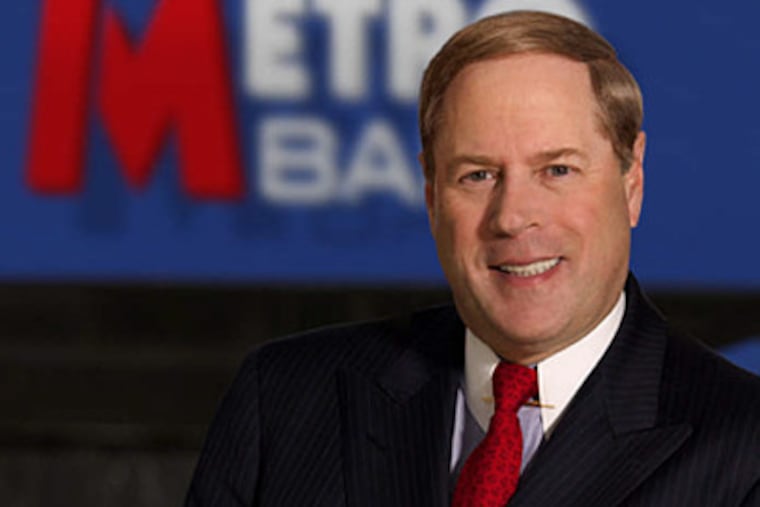Commerce founder Hill fights for golden parachute
Whether the jury will feel sympathy for Vernon W. Hill 2d, the ousted founder of Commerce Bank, and his legal quest to wrest $17.2 million in golden parachute benefits from the bank remains to be seen.

Whether the jury will feel sympathy for Vernon W. Hill 2d, the ousted founder of Commerce Bank, and his legal quest to wrest $17.2 million in golden parachute benefits from the bank remains to be seen.
In federal court Thursday, Hill explained why he didn't fight his June 28, 2007, firing from the banking empire that he had built from one storefront in Marlton in 1973.
"This was my bank," Hill said in U.S. District Judge Robert B. Kugler's Camden courtroom. "It was obvious to me that the best thing for the bank was for me to leave."
When Hill left, the bank's board agreed that he deserved the money, according to the terms of his employment contract. But board members said they couldn't pay him without regulatory approval from the Office of the Comptroller of the Currency (OCC) and the board of governors of the Federal Reserve.
The question before the jury is whether officials of Commerce Bank tried hard enough to persuade the regulators to allow the payment or whether Commerce's new owner, TD Bank Financial Group, simply used the regulators as an excuse to avoid paying Hill.
In January 2008, Hill filed a lawsuit against Commerce and its board demanding the money. Between the time he left and the time he filed his suit, TD announced that it would pay a premium price of $8.5 billion to acquire Commerce.
According to legal papers, Hill didn't get a dime of that - his stock options are tied up in the $17.2 million, which includes leftover salary and bonuses, plus stock options and interest. The interest, Hill told the jury, is growing at about $1,800 a day.
On the stand Thursday, a composed and confident Hill led the jury through his career.
A graduate of the University of Pennsylvania's Wharton School, Hill started a real estate development business to help retailers find locations.
"McDonald's was our first client," he said.
"I always wanted to be in banking," he said. At 26, having assembled a group of investors and $1.5 million, he opened the first office of Commerce Bank, with a staff of nine.
"We saw ourselves as a nonbank," he said. "We saw ourselves as a retailer. . . . It was all built around the model that the customer [desired] convenience and service."
The bank pioneered seven-day banking and offered free coin counting. By 2007, Commerce had expanded to 425 branches. Some were in locations developed by Hill's real estate company and nearly all were designed by Interarch, an architecture and design company owned by his wife, Shirley.
"She was [instrumental] in the building, in the branding, in the marketing, and in the experience" of the bank, Hill told the jurors.
"We were aware that there might be a perception issue with my wife working for the bank," he said. "So we did a lot of work to explain this to the stock market."
Federal filings always noted these related-party deals, and the bank's board at one point hired an outside evaluator to make sure that Hill's real estate company and his wife's design company weren't taking advantage of the bank.
"I would say the reverse was true," he said.
Until late 2006 and early 2007, regulators didn't take notice, he said, but then, unexpectedly, they did.
"There was nothing new, so we were perplexed," he said. Perplexity turned to concern when OCC said it would not approve any new branches.
"They went on a witch hunt, but they couldn't find anything," he said.
Hill said Commerce tried to allay the regulators' concerns but knew there was no point in litigation. "The U.S. government has tanks. We don't. It's strictly a one-sided fight," he said.
Amid increasing pressure from federal regulators focused on his business and his wife's connections, Hill was fired "without cause" on June 28, 2007. The next day, he resigned from a related entity, severing his ties from the business he started.
A TD insurance executive testified Wednesday that federal regulators required the bank to certify that they had no evidence of wrongdoing on Hill's part before they would be willing to allow him to be paid.
But the executive, John Fisher, citing many class-action lawsuits, bank regulatory documents, and a report on a 2005 federal pay-to-play Philadelphia City Hall corruption case in which two top Commerce officials were convicted, prevented the bank from making that certification.
In his questioning, Hill's attorney, Edwin J. Jacobs of Jacobs & Barbone in Atlantic City, asked Hill if TD officials would have had access to outside reports that indicated that the bank's dealings with Hill's real estate company and his wife's design company actually benefited the bank. Yes, Hill said.
Jacobs asked him if he had seen any evidence that bank officials had used those reports or made any specific effort to overcome the regulatory hurdles to get Hill paid. Hill said no.
Jacobs asked Hill if he had ever done anything to hurt the bank.
"I did everything to help the bank," Hill said.
Attorney William Tambussi of Brown & Connery in Westmont is representing the bank.
When Hill first brought his lawsuit, his wife was a plaintiff, but she dropped out of the case in September 2012.
Commerce board members at one time were named as defendants, including George E. Norcross 3d and Joseph Buckelew, who are now partners in the company that owns The Inquirer.